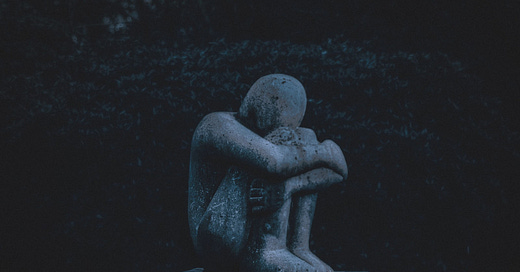The news during the last seven years—roughly the time Noel and I have been working on our book—has often been sad, depressing, heartbreaking: the election of public officials who care more about power than the common good, the COVID pandemic and its aftershocks, increased hatred and violence, threats to democracy, erosion of public trust in government and other institutions, denial of history, hostility toward science, a world awash with disinformation, the Russian invasion of Ukraine, war between Israel and Hamas along with indiscriminate killing of civilians. The list of the lamentable goes on and on.
Although I get weary just thinking about the public events and circumstances that warrant lament, I also know there are avenues for lament as a way to name grief, process it, and find energy for change. Some precedents, or models, of lament are found in religious traditions and others in secular spaces.
In an interview on Krista Tippett’s On Being, Old Testament scholar Walter Brueggemann was asked about the precedent in Hebrew scriptures for the secular use of lament and protest. He pointed to the laments in the Psalms and in Lamentations that are expressions not only of grief but also of hope in their insistence that the status quo is unacceptable and must be changed. Calling them “a communal resolve to hang in and take transformative action,” he said that grief and anger must be put into speech before it can become energy for social change. Lament, whether in speech or song, is the refusal “to accept the dominant definitions of reality” and the offer of an alternative vision of a more just world. Bruggemann added, “As the civil rights movement of the 1960s and ‘70s understood, singing is a way to keep your nerve.”
Song as lament has spread beyond religious tradition into secular contexts. As a genre of Christian music rooted in the indigenous music of sub-Saharan Africa and the experience of African Americans in the transatlantic slave trade and in American slavery, spirituals—some of which were laments—played a important role in the civil rights movement. Some examples are “Oh Freedom,” “Eyes on the Prize,” and “We Shall Overcome.” Peter, Paul, and Mary’s repertoire included spirituals, adaptations of spirituals, and songs influenced by the genre, such as “Sometimes I Feel Like a Motherless Child,” “Rock My Soul,” “Man Come into Egypt,” “Tell It on the Mountain,” and “This Train.”
However, spirituals were not the only kind of lament that the trio sang. Here’s an example from their album Flowers and Stones. In “No Man’s Land,” an anti-war song written by Eric Bogle and set in France some years after World War I, Mary sings in the persona of a woman who sits down to rest in a cemetery by the gravestone of Private William McBride. Here is verse 3.
Well I can't help but wonder now, Willie McBride
Do all those who lie here know just why they died?
Did you really believe them when they told you the cause?
Did you really believe this war would end all wars?But the suffering, the sorrow, the glory, the shame
The killing, the dying: it was all done in vain
For William McBride, it's all happened again
And again and again and again and again
From the psalms and laments of the Hebrew scriptures to contemporary music of social concern, songs of lament have had the power to amplify the cries of pain and hurt of those who suffer from unjust circumstances and systems and to offer hope through poetry that breaks through the resistance of those who are content with keeping things just the way they are. Noel has carried forth PP&M’s legacy of social into Music to Life, the nonprofit he co-founded in 2000 with his daughter Liz Stookey Sunde. It connects socially conscious musicians with the mentors, resources and training needed to realize their bold visions for community change. These musicians continue to use songs of lament, through a variety of genres, to give voice to the voiceless and advocate for positive social change.
Connections
See photos of “No Man’s Land,” a display collected by Durham University.
Hear the On Being interview, “Honest Speech and Transformative Potential,” in which Walter Brueggemann talks about the Psalms and the Book of Lamentations as precedents for protest and social change.
Photo by K. Mitch Hodge on Unsplash
What songs of lament have been meaningful to you? How have they helped you either process grief or move you to action?
Vibrations
Listen to “No Man’s Land” from the PP&M album Flowers and Stones.





Thank you for bringing attention to “No Man’s Land.” I just listened to it. It is such a haunting song, especially the week we observe Veteran’s Day, née Armistice Day, established to commemorate the signing of the treaty to end the war of all wars.
Your reflection on lament reminds me the writing of Waltrina Middleton, a cousin of DePayne V. Middleton, who was killed in the shooting at Bethel AME Church in Charleston on June 17, 2015. She holds that lament, rather than forgiveness, is the righteous response to Dylann Roof’s act of killing. Lament legitimizes the sorrow and anger of those impacted by violence. Forgiveness tends to minimize the indignity perpetrated against them.
https://www.christiancentury.org/article/first-person/i-don-t-forgive-man-who-murdered-my-cousin-depayne-mother-emanuel
As you remind us, in the honest expression of our deepest emotions before God, hope can arise.
Not sure THE OLD RUGGED CROSS qualifies as a song of lament, but it helped me through my dad’s passing in 1973. I was just 20 years old, a new Christian of only six months. It was his favorite hymn and he sang it often. I would sing it to myself, hear his voice, and it kept me close to him in a difficult time.